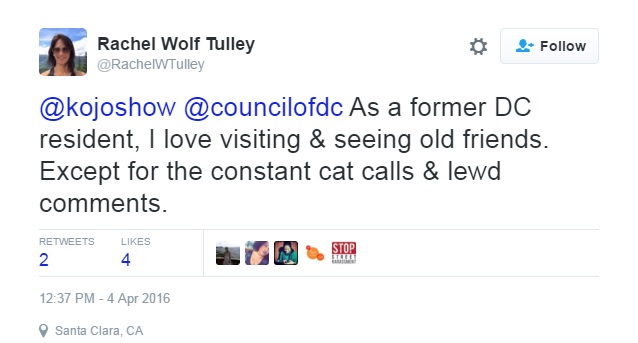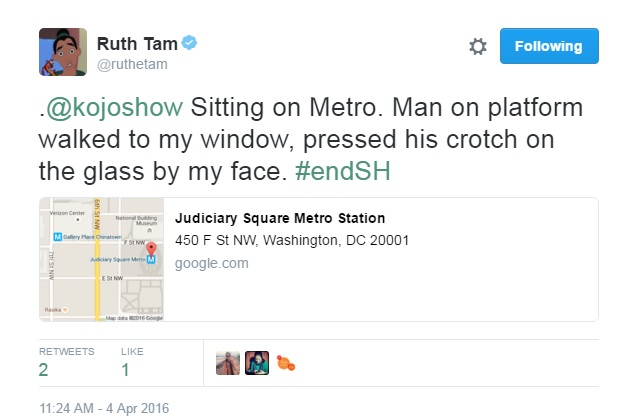April 15, 2016
Breaking Down Sexual Harassment On D.C.’s Metro By The Numbers

Last week, The Kojo Nnamdi Show tackled the challenging topic of street harassment in our region. The conversation was personal for many of our listeners—and members of our staff—who called in to the program or took to Twitter to share their frequent and often scary experiences of being harassed in our city’s public spaces.
One of our guests on the program was Jessica Raven, the executive director of Collective Action for Safe Spaces or CASS. Jessica told Kojo that in curating her organization’s My Streets, Too blog, which collects and shares stories of harassment from Washingtonians, she saw a trend: incidents frequently occur on our city’s public transportation system.
In January, CASS and another local advocacy organization, Stop Street Harassment, teamed up with WMATA to conduct a survey on sexual harassment that occurs on public transit. The findings of that survey of 1,000 people were released this week. It found that women are three times more likely than men to experience harassment aboard the Metro system. 21 percent of women are harassed on our region’s public transportation, a rate that is slightly higher than the nation’s average.
Kojo Show producer Ruth Tam could relate.
Like Ruth, 62 percent of those who experienced harassment on Metro say it happened on a train. In addition, nearly as many Metro customers harassed on the Metro experienced it in the station itself.
Harassment also happens on city buses, although not as frequently. Here’s how one Kojo Show listener responded when he witnessed harassment while riding the 70 bus:
Dude kept catcalling a woman & telling her how fine she is. I changed seats & spent that whole ride on the 70 beside him flirting right back
— ♭oſsi (@thisisbossi) March 16, 2016
The survey also looked at how often harassment happens at our city’s other public spaces. 37 percent reported experiencing harassment while walking in the region and 16 percent while in a store, like Kojo Show listener Julie Clare.
@kojoshow Harrassment was really bad when I worked retail- creepers harass young women who can't tell them off w/out risking job.
— Julie Clare (@clarejc) April 4, 2016
Another 10 percent experienced harassment at an arena, and 7 percent while in a car, like Kojo’s own barber, who purchased tinted windows to shield herself from crude behavior from people on the street.
"I'm tired of guys looking through my windows and making obscene gestures at me," –Kojo's barber, who tinted her car windows. #endSH
— The Kojo Nnamdi Show (@kojoshow) April 4, 2016
The most common type of harassment on the metro was verbal.
Riding @wmata red line man stopped beside my seat & told me I was gorgeous. I said "Keep Walking". He didn't. Glad the train was full #EndSH
— Avery J.C. Kleinman (@AveryJCK) April 15, 2016
In response, WMATA has been working with CASS and Stop Street Harassment since 2012 to address the problem. If you’re a Metro rider, you’ve probably seen the PSAs in trains that encourage riders to report harassment.

Photo courtesy of Collective Action for Safe Spaces
Despite the PSAs, the survey found that 77 percent never reported their experiences. Only 16 percent reported their incidents to a Metro employee, and 5 percent called Metro Transit Police, as the PSA suggests. No one called 911.
But some listeners suggested the lack of reporting has to do with how often it happens.
If I mentioned every time I got street harassed – you'd all stop following my twitter. It'd be so repetitive, so so repetitive.
— Sara Lang (@SaraLang) April 4, 2016
@SaraLang Exactly. I don't discuss 99% of the harassment I experience, but I live with the fear of retaliation. But we're called "sensitive"
— Tracey Ross (@traceylross) April 4, 2016
During the segment, Jessica Raven of CASS emphasized that there is no right way to respond. “The best way to respond is whatever makes you feel safest in the moment. But I encourage people to speak out, to let the harasser know that the behavior isn’t acceptable,” she said.
Jessica and D.C. Councilmember Brianne Nadeau, who spoke with Kojo about her efforts to get the city government to address street harassment, emphasized that education about the problem is key.
Have you experienced harassment on the metro? Share your experience in the comments below. To report an incident, visit wmata.com/harassment.





